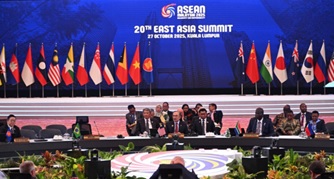13 October, 2025
20th East Asia Summit (EAS)
Fri 31 Oct, 2025
Context
The 20th East Asia Summit (EAS) marked a significant milestone in promoting regional peace, stability, and economic cooperation in the Indo-Pacific region. The summit adopted the Kuala Lumpur Declaration, reaffirming the collective commitment of member nations to strengthen multilateralism, uphold international law, and enhance cooperation across multiple strategic and developmental areas.
Background and Establishment
- The East Asia Summit (EAS) was established in 2005, with the first summit convened in Kuala Lumpur, Malaysia.
- It represents the most inclusive forum under the ASEAN-led architecture, enabling dialogue among major global and regional powers.
- The EAS embodies ASEAN’s centrality in the regional security and cooperation structure.
Members of the East Asia Summit
As of 2025, the EAS has 18 member countries, including:
- ASEAN Member States (10): Brunei, Cambodia, Indonesia, Laos, Malaysia, Myanmar, Philippines, Singapore, Thailand, and Vietnam.
- Dialogue Partners (8): Australia, China, India, Japan, New Zealand, Republic of Korea, Russia, and the United States.
These nations collectively represent over 54% of the world’s population and account for nearly 60% of global GDP, making EAS a vital forum for regional and global cooperation.
Membership Criteria
To become a member of the EAS, countries must meet three essential requirements:
- Sign the ASEAN Treaty of Amity and Cooperation (TAC) — reflecting their commitment to peaceful coexistence and non-interference.
- Be a formal dialogue partner of ASEAN.
- Maintain substantive cooperative relations with ASEAN across multiple domains such as trade, security, and development.
Objectives of the 20th East Asia Summit
The primary focus of the 20th EAS was to deepen engagement in key strategic areas while reinforcing ASEAN centrality in the Indo-Pacific region.
Key highlights of the Kuala Lumpur Declaration include:
- Strengthening cooperation on maritime security, economic resilience, and sustainable development.
- Promoting a rules-based international order, respect for sovereignty, and peaceful resolution of disputes.
- Enhancing connectivity and digital transformation for inclusive growth across the region.
- Reaffirming commitment to climate action, health resilience, and education cooperation.
Priority Areas of Cooperation within EAS
| Priority Area | Key Focus |
| 1. Environment & Energy | Renewable energy, energy efficiency, and clean technologies. |
| 2. Education | Promoting academic exchanges, scholarships, and digital learning platforms. |
| 3. Finance | Strengthening financial stability and promoting inclusive growth. |
| 4. Global Health Issues & Pandemic Diseases | Enhancing cooperation in disease surveillance and vaccine access. |
| 5. Natural Disaster Management | Sharing best practices in early warning systems and disaster recovery. |
| 6. ASEAN Connectivity | Infrastructure, transport corridors, and digital networks. |
India’s Role in EAS
India, as a founding member of the EAS, plays a crucial role in promoting ASEAN centrality and the Indo-Pacific vision based on inclusivity, openness, and rules-based order.
- India advocates for freedom of navigation, respect for sovereignty, and peaceful dispute resolution.
- Through initiatives like Act East Policy and Indo-Pacific Oceans Initiative (IPOI), India complements EAS objectives in maritime cooperation, connectivity, and sustainable growth.
- India also emphasizes collaboration in healthcare, digital innovation, renewable energy, and counterterrorism.
Significance of the 20th EAS
- Strengthened Regional Architecture: Reinforces ASEAN’s role as the central pillar of the Indo-Pacific.
- Enhanced Economic Integration: Promotes trade resilience and sustainable supply chains post-pandemic.
- Climate and Health Collaboration: Encourages shared responsibility for climate resilience and global health preparedness.
- Maritime Security: Addresses regional challenges in the South China Sea through dialogue and mutual respect.
Conclusion
- The 20th East Asia Summit and the Kuala Lumpur Declaration reaffirmed the commitment of EAS nations to uphold peace, prosperity, and stability in the Indo-Pacific.
- With India and other major powers actively participating, the summit serves as a cornerstone of multilateral diplomacy and a vital platform for addressing global challenges through cooperation, inclusivity, and shared responsibility.
- The EAS continues to evolve as an anchor of strategic dialogue and economic integration, essential for shaping the future of Asia and the world.


















